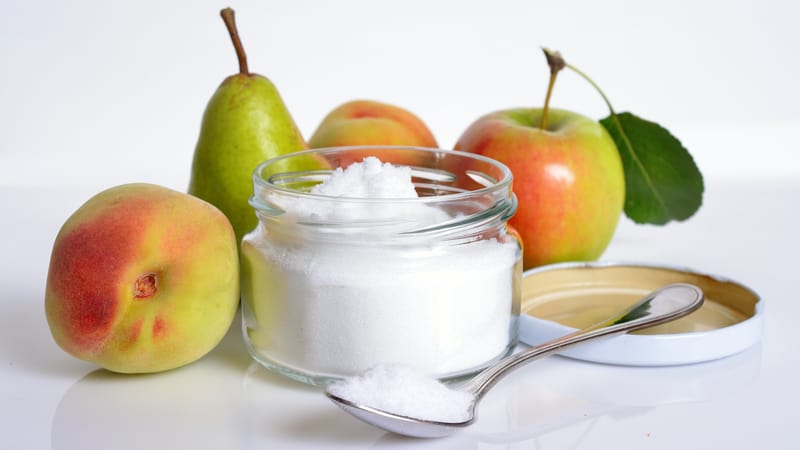Health: The Scoop on Fructose
Has this sweetener indeed earned its bad reputation?

Fructose is a simple sugar with a bad reputation. Sweeter than table sugar — which it’s a component of — and primarily found in many fruits and some vegetables, fructose once enjoyed status as a “healthier” sweetener. More recently, it’s had a fall from grace, stemming in part from the ubiquitousness of high-fructose corn syrup in processed foods. But what does the science say about the pros and cons of it? And is fructose actually bad for you?
What’s so different?
Fructose and glucose are both monosaccharides, the simplest form of sugar. Sucrose, or table sugar, is a disaccharide made up of equal parts fructose and glucose. “Regardless of whether a sugar is natural or added to foods and beverages, most sugars are metabolized by the body in similar ways,” says Kris Sollid, RD, Senior Director of Nutrition Communications at the International Food Information Council (IFIC). “However, fructose is primarily metabolized by the liver; this is different than how the body handles other sugars.”
“It does not require insulin to be absorbed and therefore has a low impact on blood glucose levels. This may cause some to believe that fructose is ‘healthier’ than other sugars,” Sollid says. “Conversely, because it is handled by the liver, some view it as uniquely detrimental to health.”
Interest in fructose as an alternative sweetener for people with diabetes began in 1915; the American Diabetes Association recommended its use starting in the 1970s. However, concerns emerged in the early 2000s that this sweetener may have a harmful effect on levels of cholesterol, triglycerides, and other blood lipids.
The claims
Today, beliefs about fructose range from fearing fruit to revering agave syrup — a high-fructose sweetener. Sollid points out that nutrition scientists have also debated its role in health, a debate summed up in a 2016 review in the European Journal of Nutrition. While it does not appear to have a unique impact on health, “fructose-containing sugars can lead to weight gain; increase in cardiometabolic risk factors; and disease only if it provides the excess calories.”
Research in the ensuing five years has come to similar conclusions. Two 2017 systematic reviews and meta-analyses in the American Journal of Clinical Nutrition looked at studies that replaced glucose or sucrose with fructose in foods and beverages. One concluded that this may have a slight benefit for people with high blood sugar or Type 2 diabetes. The other found that replacing glucose or sucrose significantly lowered post-meal blood sugar levels; at least in people with prediabetes and Type 1 and Type 2 diabetes, and without significantly increasing triglyceride levels.
A 2020 systematic review and meta-analysis published in the Journal of the American Medical Association found that higher consumption of fructose via sugar-sweetened beverages was associated with a higher risk of developing metabolic syndrome; but consumption of whole fruit and up to 8 ounces of 100 percent fruit juice per day had a protective effect.
A 2019 systematic review and meta-analysis in the Journal of the American Heart Association found similar results when looking at associations between fructose consumption and high blood pressure.
Who should avoid it?
While in moderation it appears to be fine for most people, there are two groups of people who do need to shun this particular sweetener. Some individuals with irritable bowel syndrome (IBS) find that foods high in fructose trigger their symptoms. (These include honey, agave syrup, and many fruits.)
Consuming high-fructose foods and beverages isn’t necessarily harmful; but the resulting digestive disturbances; this includes diarrhea, boating and abdominal discomfort, can affect quality of life. More serious is hereditary fructose intolerance, a rare genetic disorder that about 1 in 30,000 people are born with each year. Individuals with this disorder are unable to digest fructose and must avoid it completely in order to prevent liver damage. This also means avoiding table sugar.
The big picture: is fructose actually bad for you?
Fears about this sweetener and demonization of high fructose corn syrup have contributed to the idea that sucrose is a “safer” sugar, and indeed some trendy soda and beverage companies began touting that their products were sweetened with “pure cane sugar.” Similarly, the trend towards “natural” sweeteners has given honey and agave syrup a health halo; but both contain more fructose than high-fructose corn syrup.
However, are consumers failing to see the forest for the trees when they shun high-fructose corn syrup; but then lose sight of how much total added sugars they may be consuming? General recommendations are to reduce or limit all added sugars, but about 6 in 10 American adults consume more added sugar than is recommended.
“It’s important to keep the consumption of added sugars low, regardless of the type. But ‘low’ doesn’t have to mean ‘no.’” Sollid says. “A healthy eating pattern is not determined by whether it includes or avoids added sugars. Healthy eating patterns can include small amounts of added sugars, while excessive amounts of added sugars can contribute to an unhealthy eating pattern.”
And for even more wellness tips, visit our health page!
Reprinted with permission from Environmental Nutrition, a monthly publication of Belvoir Media Group, LLC. 800-829-5384. www.EnvironmentalNutrition.com.
©2021 Belvoir Media Group. Distributed by Tribune Content Agency, LLC.

